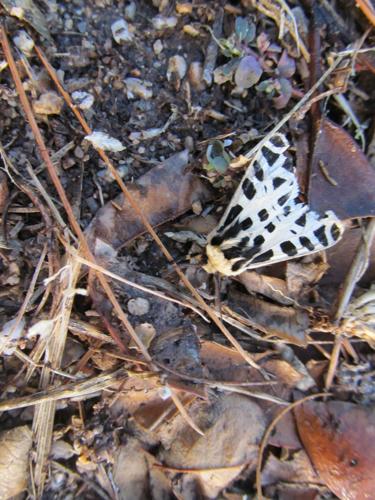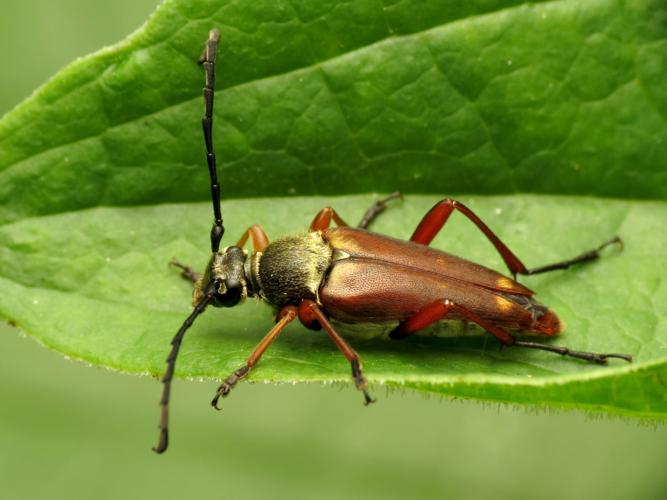Q: I don’t know if this new visitor is a positive or negative for the vegetable garden.
A: Your visitor is the Mexican tiger moth (Notarctia proxima). I couldn’t say if it is positive or negative for your garden without more information about where you found it and what, if anything, it could have been eating.
The tiger moths can have a diverse diet and have been known to be problematic on certain plants. This species hasn’t been studied as much as its more famous relatives the fall webworm, the banded woollybear caterpillar, and the invasive gypsy moth so there isn’t as much information about what plants it might like.
Q: Any idea what these beetles are?
A: These beetles are commonly known as flower longhorns because they are seen feeding on nectar and pollen from flowers. They are from the Cerambycidae family of beetles and called longhorn beetles due to their long antennae.
Larvae of this type feed on dead, moist wood and adults lay their eggs there. This beetle is not considered to be a pest.
Some other longhorn beetles are considered pests so it’s important to check if you see them on trees and shrubs.
Q: I have a deck that overlooks a wash. For years, I have been trying to plant various things in pots on the deck, but most of them get eaten by pack rats. The only plants that have survived are rosemary, lavender and geranium.
Do you have any other recommendations for flowering plants that pack rats would reject? Or effective pesticides? Or unusual ways to approach the pack rat problem?
Among the things I have done is to hire someone who is quite knowledgeable, but have seen limited success. The last thing he said to me was to give up planting on pots in my deck.
A: Predicting what animals will not eat is difficult. If the weather is dry and their favorite plants dry up, pack rats and other animals will eat what’s available.
The fragrant plants they avoided on your deck are a clue to their preferences but I wouldn’t expect them to avoid anything in a pinch. There are rodenticides you can use but they are not effective in the long term because they only take out a few rats and don’t solve the overall problem. Pesticides are also poison for any other animal so you would need to be careful to protect pets and other wildlife.
The best strategy for pack rat management includes nest removal, trapping and habitat modification to limit food sources so they won’t reestablish nearby.
Living next to a wash puts you at a disadvantage because you can only manage so many potential nest sites. In any case, modifying your landscape is not a one-and-done solution.
The nesting sites will grow back and must be maintained for long-term effectiveness. Keep an eye out for places they might make a nest.
We humans create a lot of containers and things with nice cavities in them that are just right for a nest. If pack rats are able to access plants on your deck, then they will probably be back.
You might consider using containers that have slippery sides so they are unable to climb into the plants. Some folks use metal troughs designed for watering livestock and they seem to work.
Q: Would you please tell me when you advise starting to fertilize citrus this year and what product you recommend. We live just south of Sunrise Drive — not sure what the elevation is—about 2,800 feet I think.
A: The first date for fertilizing citrus is in the January/February time frame. How much you use is dependent on the size of the tree.
To determine the appropriate amount it would be wise to check the publication “Citrus Fertilization Chart for Arizona” (az1671) that can be accessed through your favorite search engine on the internet at tucne.ws/h3r.
There are some products labeled as citrus fertilizer so you could look for them where you shop.





